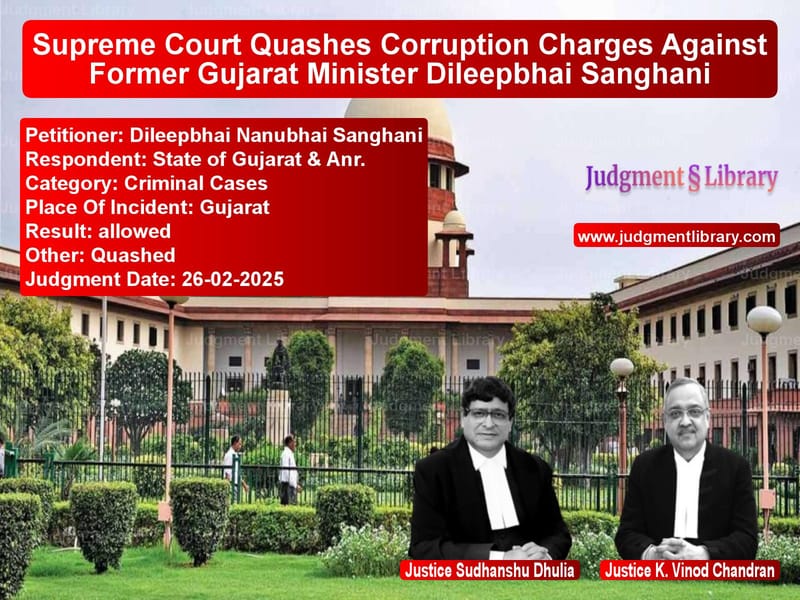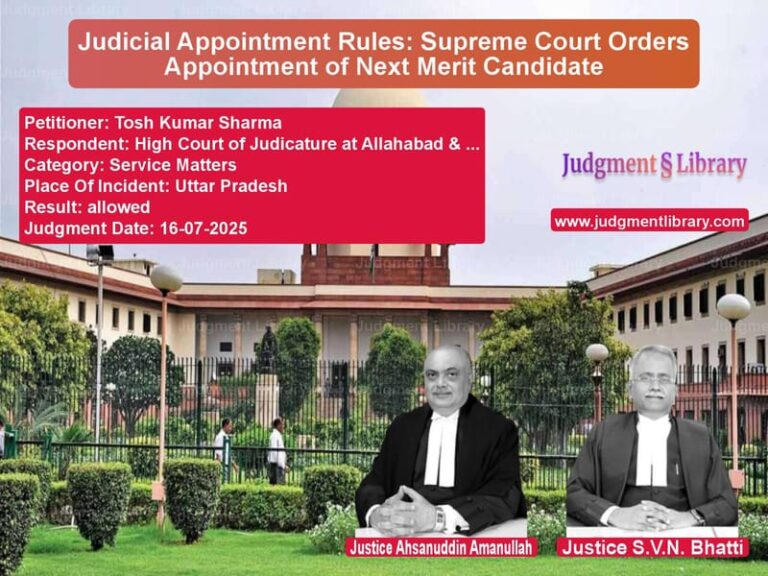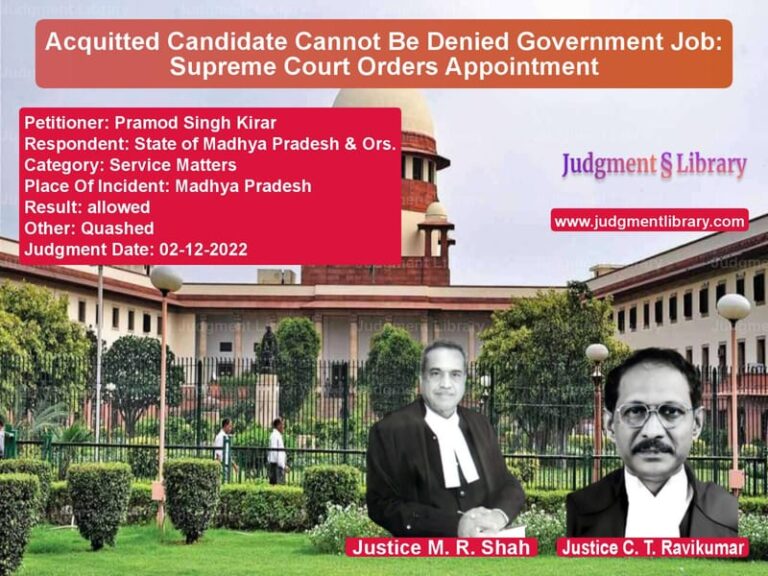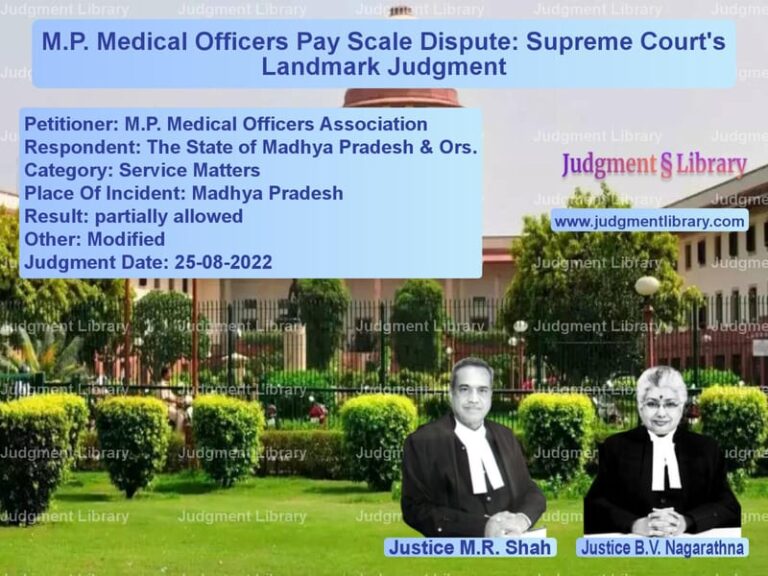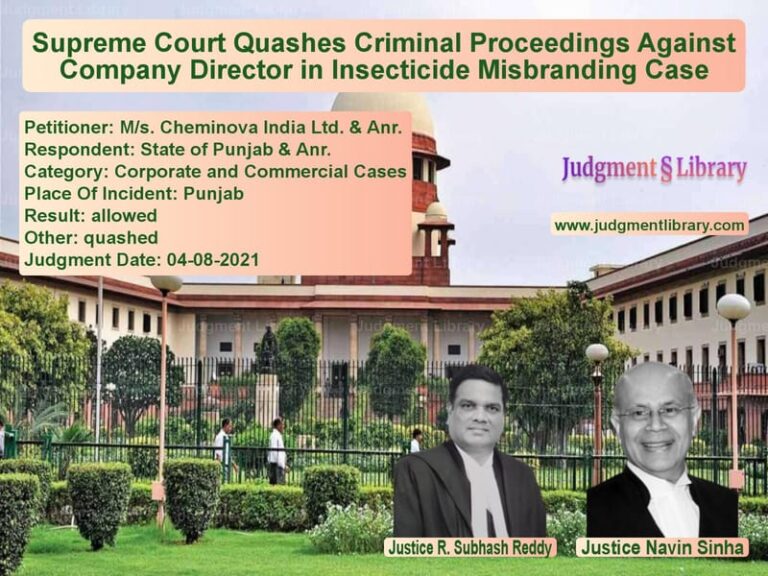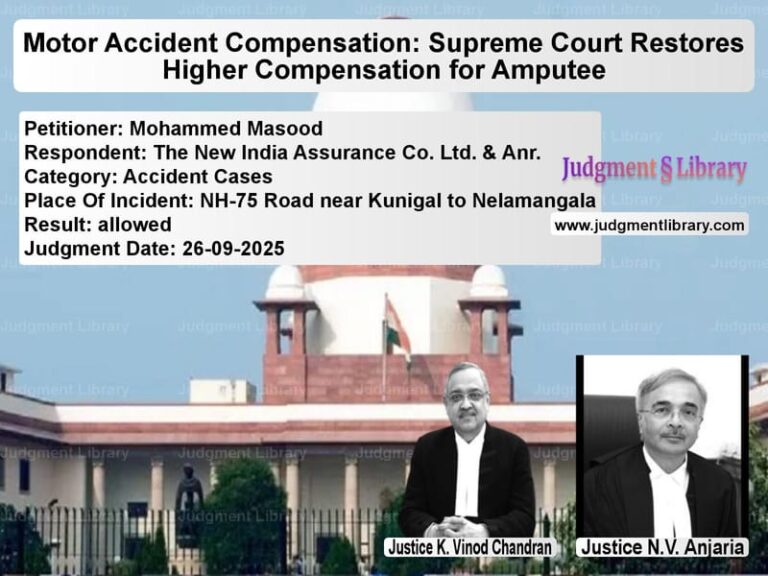Supreme Court Quashes Corruption Charges Against Former Gujarat Minister Dileepbhai Sanghani
The case of Dileepbhai Nanubhai Sanghani vs. State of Gujarat & Anr. is a landmark decision by the Supreme Court that underscores the importance of substantial evidence in corruption cases. The case involved allegations that the former Gujarat minister engaged in corrupt practices while allocating fishing contracts in reservoirs under his jurisdiction. However, after reviewing the evidence, the Supreme Court found that there was no direct proof of bribery or wrongdoing, leading to the quashing of the criminal proceedings against him.
The judgment serves as a reminder that criminal proceedings should not be initiated based on mere allegations. Courts must ensure that cases are backed by solid evidence before subjecting public officials to lengthy trials that may damage their reputation and career.
Background of the Case
Dileepbhai Nanubhai Sanghani was a minister in the Gujarat government when he was accused of illegally granting fishing contracts without following the proper tendering process. The contracts, which involved state-owned water bodies, were allegedly awarded to individuals who had promised kickbacks. The case was initiated based on a complaint that the lack of a tendering process led to financial losses for the state exchequer.
The key allegations were:
- The fishing contracts were granted without following the state’s mandatory tendering process.
- Selected individuals received contracts in exchange for alleged kickbacks.
- The state suffered financial losses due to the alleged manipulation of contract allocation.
- The minister allegedly derived personal benefits from these illegal grants.
The Gujarat High Court had earlier dismissed Sanghani’s plea to quash the proceedings, prompting him to approach the Supreme Court for relief.
Legal Proceedings
High Court Ruling
The Gujarat High Court refused to quash the corruption case, reasoning that:
- The failure to conduct a tendering process raised legitimate concerns.
- The case required further investigation to determine if any personal gains were involved.
- A prima facie case was made out for trial under the Prevention of Corruption Act, 1988.
Following this decision, Sanghani filed an appeal before the Supreme Court, arguing that the allegations against him were baseless and politically motivated.
Arguments Before the Supreme Court
Petitioner’s (Dileepbhai Nanubhai Sanghani) Arguments
The petitioner’s senior counsel, Mukul Rohatgi, presented the following arguments:
- There was no direct evidence linking Sanghani to bribery or personal financial gains.
- The allocation of fishing contracts was done to benefit local tribal communities as per state policy.
- The complainant had challenged the allocation process through a writ petition in 2008 but only later raised allegations of corruption.
- The High Court failed to consider that the allocation was made in accordance with existing government policies.
- Criminal prosecution should not be based solely on procedural lapses unless mala fide intent is established.
Respondent’s (State of Gujarat) Arguments
The state’s counsel opposed the petition and made the following arguments:
- The tendering process is a mandatory legal requirement, and any deviation indicates favoritism.
- The decision to bypass tenders caused financial losses, proving that the process was misused.
- While direct evidence of bribery was not available, the circumstantial evidence pointed to corruption.
- Since the case was still at a preliminary stage, it required a full trial rather than quashing at this stage.
Supreme Court’s Observations
The Supreme Court examined whether there was sufficient evidence to justify the continuation of criminal proceedings. The bench, comprising Justices Sudhanshu Dhulia and K. Vinod Chandran, made the following key observations:
“There is no material to suggest that the appellant demanded or accepted bribes. The mere failure to follow tender procedures does not automatically imply corruption.”
The Court also noted:
- The policy under which the contracts were allocated was intended to support marginalized communities.
- The complainant’s delay in raising allegations cast doubt on his motives.
- The allocation of contracts, while irregular in process, did not establish criminal intent.
- The case appeared to be based on procedural lapses rather than criminal misconduct.
Supreme Court Judgment
The Supreme Court ruled in favor of Sanghani, setting aside the Gujarat High Court’s decision and quashing the criminal proceedings. The ruling emphasized that criminal charges should be based on concrete evidence rather than assumptions.
The key rulings were:
- The corruption charges against the appellant were quashed.
- The Gujarat High Court’s order refusing to quash the FIR was set aside.
- The criminal case against the appellant was dismissed.
Key Takeaways
- Burden of Proof in Corruption Cases: Accusations must be backed by substantial evidence, not just procedural lapses.
- Government Policy Implementation: Courts must differentiate between policy decisions and criminal acts.
- Judicial Restraint in Political Cases: The ruling prevents the misuse of corruption laws for political vendettas.
- Protection Against Malicious Prosecution: The judgment reinforces safeguards against baseless criminal charges.
Conclusion
The Supreme Court’s ruling underscores the principle that criminal cases should not proceed unless there is credible evidence. The decision ensures that procedural errors do not automatically translate into corruption charges, thereby protecting public officials from frivolous prosecutions.
Petitioner Name: Dileepbhai Nanubhai Sanghani.Respondent Name: State of Gujarat & Anr..Judgment By: Justice Sudhanshu Dhulia, Justice K. Vinod Chandran.Place Of Incident: Gujarat.Judgment Date: 26-02-2025.
Don’t miss out on the full details! Download the complete judgment in PDF format below and gain valuable insights instantly!
Download Judgment: dileepbhai-nanubhai-vs-state-of-gujarat-&-a-supreme-court-of-india-judgment-dated-26-02-2025.pdf
Directly Download Judgment: Directly download this Judgment
See all petitions in Fraud and Forgery
See all petitions in Public Interest Litigation
See all petitions in unfair trade practices
See all petitions in Judgment by Sudhanshu Dhulia
See all petitions in Judgment by K. Vinod Chandran
See all petitions in allowed
See all petitions in Quashed
See all petitions in supreme court of India judgments February 2025
See all petitions in 2025 judgments
See all posts in Criminal Cases Category
See all allowed petitions in Criminal Cases Category
See all Dismissed petitions in Criminal Cases Category
See all partially allowed petitions in Criminal Cases Category

